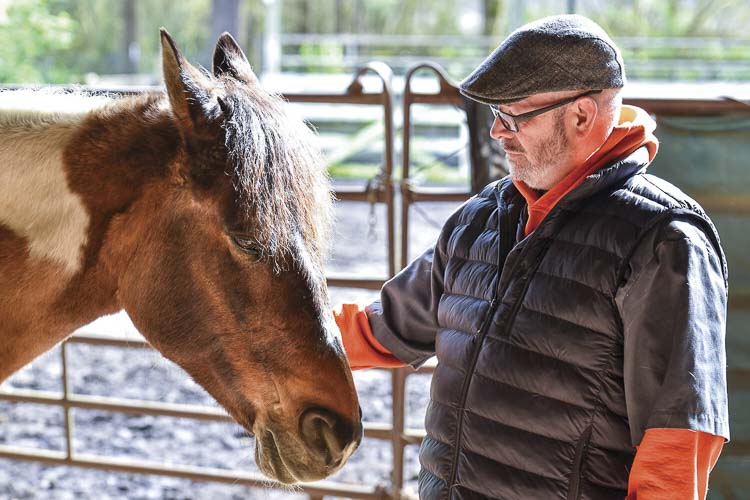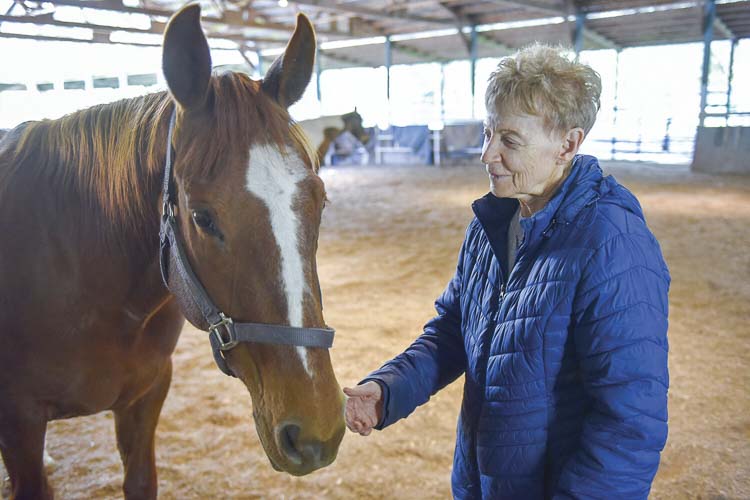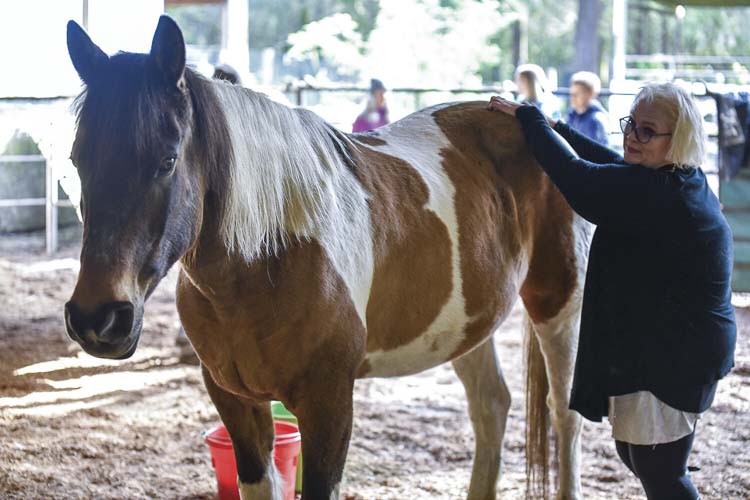
The Windhaven Veterans Program, a service under Lifeline Connections’ Healing Animal Partners Program, uses equine-assisted therapy to help veterans regulate emotions, rebuild trust and reclaim a sense of peace
Norman Helgason
The Reflector Newspaper
At a quiet ranch in Clark County, veterans battling post-traumatic stress disorder (PTSD) are reconnecting with themselves, with each other and with four-legged friends who weigh over 1,000 pounds.
The Windhaven Veterans Program, a service under Lifeline Connections’ Healing Animal Partners Program (HAP), uses equine-assisted therapy to help veterans regulate emotions, rebuild trust and reclaim a sense of peace. The program, unique in Southwest Washington, serves a population that often feels isolated or underserved by traditional care.
A similar program for veterans was held at Windhaven Therapeutic Riding in La Center, though the owners of that program have since retired. Lifeline Connections has operated the program locally since November 2022.
“We’re looking at increasing positive health outcomes, increasing patient satisfaction and services,” Kara Seibert, director of the Healing Animal Partners Program, said.
The Windhaven Veterans Program provides an eight-week group for veterans struggling with the debilitating impacts of PTSD, with options for single sessions.
Equine therapy is a crucial service in a region with significant unmet needs, according to Seibert. There are an estimated 32,800 veterans in Clark County, and 12.9%, an estimated 4,264 people, may experience the debilitating effects of PTSD. According to Seibert, between 2,750 and 6,900 local veterans are not receiving evidence-based psychotherapy, despite the impact that PTSD can have on daily life.
The group sessions are intentionally designed. Horses, with their heightened awareness and natural response to human energy, serve as mirrors for participants’ internal states.
“81% of veterans complete our program, which is huge when you consider that 42% tend to withdraw from traditional PTSD treatment,” Seibert said.

Separate from standard talk therapy, equine-assisted therapy doesn’t ask veterans to relive trauma. Instead, it uses present-moment awareness and the horses’ biofeedback to help veterans regulate and reflect.
In a typical group, participants work through structured activities with the horses. Volunteer Judy Glenney, who has volunteered with the program for two years, said the shift in demeanor is visible week to week.
“Some of them will take readily to the horses, and that opens them up further,” Glenney said. “Some are not quite as ready to interact with the horse, but … as they come to grips with themselves, as they are feeling more comfortable with where they’re at, they can interact with the horses.”
Glenney plays a safety and support role during sessions, but her perspective also comes from watching bonds develop between people and animals.
“When they see this bond, when the horse is really with them in that partnership, they just, they just light up,” Glenney said. “And they realize they could have that in a relationship with a person.”
She pointed to Indy, a mare who had experienced abuse and is sensitive to touch. That, Glenney said, makes her particularly relatable to veterans.
“You have to really pay attention to what Indy is telling you,” Glenney said. “If she comes back with her ears back … she’s telling you ‘no.’ Then respect that.”
For Robert Molitor, a veteran who completed the 10-week Windhaven program, connecting with horses helped unlock something he couldn’t get through traditional talk therapy.
“I described myself as a shark — cold eyes, cold personality,” Molitor said. “Hyper aware, vigilant, all those kinds of things. I still have those things in my system but not at the rate that I had them.”

Molitor said equine therapy helped him learn to read and accept different types of social cues while also giving him space to decompress.
“When I was in that group, I always felt like I was amongst many and I was with them because I had people who were (from) similar life experiences,” he said. “When you get a chance to just open up in a group like that, it was powerful.”
He’s now part of a weekly equine session and takes part in alumni events hosted every 90 days.
“Sunday, I was stimulated. It happens,” he said. “I was in a big crowd, and I … I was anxious to the point where I was almost hyperventilating … But today’s Wednesday, it’s not Sunday, so learning how to let go of Sunday and rely on (today’s). A lot of this has been helpful because I would carry Sunday into next year.”
With support from the program’s staff, Molitor is developing better responses when symptoms flare up.
“It’s just a healthy, safe place to let things out without anything else to worry about,” he said.
As of last week, 26 local veterans have completed the program under Lifeline Connections, with four new participants starting Saturday. With thousands of veterans in Clark County potentially living with PTSD, Seibert sees plenty of room to grow.
For Molitor, the connection with horses — and one in particular, Indy — continues to shape his healing. Indy, unlike many other horses in the program, experienced trauma at a young age, which shapes her interaction with humans.
“She’s like me,” he said. “Wants to be close, but needs to test if it’s safe first. When she leans into you, it’s because she trusts you. That means something.”
The American Legion Riders will hold the fourth annual Windhaven Ride for Veterans at 8:30 a.m. Saturday, Aug. 16, at Yacolt Community Church, 34502 NE Amboy Road in Yacolt. Registration and donations fund the Windhaven Veterans Program. The event page can be found at amboytumtumpost168.org/wrfv_main.
Learn more about the program by visiting lifelineconnections.org/services/veterans-services or by calling (360) 605-6096.
This report was first published by The Reflector Newspaper.
Also read:
- Work by two local artists on display at the Rebecca Anstine GalleryWork by Jason Litts and Allan Oliver is now featured at the Rebecca Anstine Gallery in Vancouver, with the show running through the end of June.
- Battle Ground Police celebrate Excellence in Service at awards ceremonyDetective Ethan Poki was named the 2024 Officer of the Year as the Battle Ground Police Department honored exceptional staff at its annual awards ceremony.
- Starbird Theatre presents “These Shining Lives”Starbird Theatre of Vancouver will present four performances of “These Shining Lives,” a moving play about workplace injustice, starting May 9.
- Camas Lions Club joins Downtown Camas Cleanup Effort to beautify the communityThe Camas Lions Club joined the Downtown Camas Association on Sunday to help refresh and beautify downtown Camas ahead of the busy season.
- Magenta Theater presents “Silent Sky,” with opening night set for Friday, May 2Magenta Theater in Vancouver launches its latest production, Silent Sky, celebrating the life and overlooked contributions of astronomer Henrietta Leavitt, with opening night on May 2.









